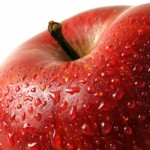1) Is grown using natural fertilizers such as compost and manure to nourish the soil and feed the plants. Chemical fertilizers and sewage are not applied.
2) Is NOT sprayed with conventional chemical pesticides. Instead, pests are controlled using natural methods.
3) Is NOT grown where weeds are sprayed with chemical herbicides. Instead, weeds are controlled by mulching, manual weeding and crop rotation.
4) Is NOT genetically modified or irradiated.
5) Is NOT combined with food additives.
6) Is NOT treated with hormones or antibiotics, in the case of livestock. Instead, the animals are given organic feed and allowed access to the outdoors. Their housing is kept clean to minimize the risk of infection.
Is Organic Produce Better?
1) Foods that have been sprayed have been found to contain pesticide residues that may be harmful to health. Such residues have even been found in baby food! There are over 850 pesticides registered with the Environmental Protection Agency (EPA) and many of these are used singly or in combination by conventional farmers to destroy agricultural pests, including insects. Many of these synthetic chemicals have been implicated in human and animal diseases. It is known that children eat more food relative to their body weight than adults do and so they will also be consuming more pesticide residues relative to their weight. Moreover, children’s detoxification systems are not completely developed so they are more vulnerable to the effects of toxic chemicals. Organically grown foods, on the other hand, are free from potentially toxic pesticide residues.
2) There is growing evidence to show that organically grown fruits and vegetables have higher levels of health-protective compounds including antioxidants, flavonoids, phytochemicals and vitamins compared with conventionally grown produce.
3) Organic farming has been shown to produce the same yields of corn and soybeans as conventional farming but using less water, 30% less energy and of course no potentially harmful chemicals. In addition, the soil quality is maintained, more water retained and there is less erosion. There is growing concern about the progressive loss of good quality topsoil in the world with conventional farming methods and the expansion of organic farming should help to reverse this trend.
Which Foods Should We Eat Only If They Are Organically Produced?
Every year, the non-profit Environmental Working Group (EWG) based in Washington D.C. publishes its Shopper’s Guide to Pesticides in Produce. The 2012 version contains updated information on 45 popular fruits and vegetables and their total pesticide loads, compiled from data obtained from the U.S. Department of Agriculture (USDA) and the Food & Drug Administration (FDA). Nearly 70 percent of the fruits and vegetables tested had detectable pesticide residues after they had been washed or peeled. The EWG classifies the worst offenders as the Dirty Dozen Plus and the cleanest fruits and vegetables as the Clean Fifteen. http://www.ewg.org/foodnews/summary
The Dirty Dozen Plus
The top 12 most contaminated fruits and vegetables on the 2012 list, the Dirty Dozen, are as follows, with the most contaminated first: Apples, Celery, Sweet Bell Peppers, Peaches, Strawberries, Nectarines (Imported), Grapes, Spinach, Lettuce, Cucumbers, Blueberries (Domestic) and Potatoes. This year, a Plus category was added to the Dirty Dozen for Green Beans and Leafy Greens (Kale and Collard Greens), because they were often found to be contaminated with organophosphate insecticides, which are known to be toxic to the nervous system. These organophosphates also showed up in some samples of Green Bell Peppers and Nectarines. To avoid consuming pesticides found in these fruits and vegetables, only organically grown, pesticide-free produce should be consumed.
The Clean Fifteen
At the other end of the spectrum, the 15 least contaminated fruits and vegetables are as follows with the cleanest first: Onions, Sweet Corn, Pineapples, Avocado, Cabbage, Sweet Peas, Asparagus, Mangoes, Eggplant, Kiwi, Cantaloupe, (Domestic), Sweet Potatoes, Grapefruit, Watermelon and Mushrooms. (Please note that over 85 percent of the U.S. corn crop is now genetically modified and the only way to be certain of avoiding this is to purchase certified organic produce.) Apart from the caveat about corn, it is considered safe to consume conventionally-raised members of the Clean Fifteen because the pesticide levels are so low.
© Christopher J. Jones, M.Sc., Ph.D.
Adventist Health Ministry,
Laguna Niguel, California, U.S.A.





{ 1 trackback }
Comments on this entry are closed.